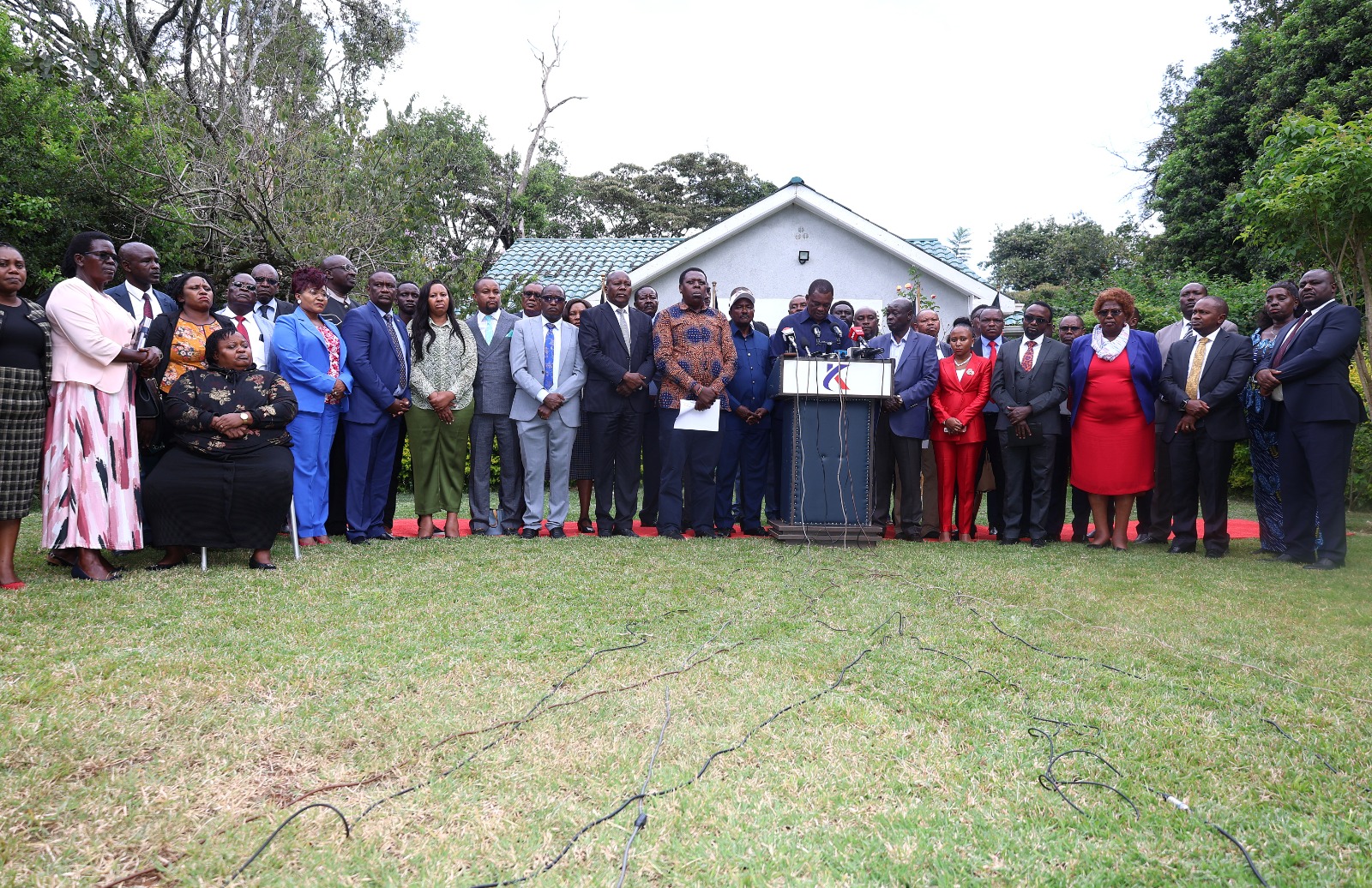
 United Opposition leaders at the SKM Command Centre in Nairobi, June 11, 2025. /KALONZO MUSYOKA
United Opposition leaders at the SKM Command Centre in Nairobi, June 11, 2025. /KALONZO MUSYOKAThe opposition has held steady to its stance that June 25 should be a "People’s Public Holiday" despite the government's dismissal of the calls, terming them efforts to "recreate" a Gen Z movement.
June 25 will fall on a Wednesday, and the United Opposition wants Kenyans to boycott work and light candles in remembrance of Gen Z, who lost their lives as a result of the brute police response to Occupy Parliament protesters on June 25, 2024.
The protests were called to oppose the impugned Finance Bill, 2024, which sought to introduce a myriad of tax measures that were deemed punitive by the majority of Kenyans—a survey showed.
In a joint statement on Wednesday, the opposition insisted that June 25 should pass as a symbolic public holiday to honour the dead protesters, more so in light of "persistent targeting, kidnapping, abductions, intimidation, unlawful arrests, and murder of young people".
Their statement was in response to the death in police cell of Albert Ojwang, a 31-year-old teacher and blogger, whose death on Sunday, June 8, came hours after he was picked up by police from Homa Bay and driven 400 km to Nairobi.
Ojwang had allegedly made an offensive social media post about Deputy Inspector General of Police, Eliud Lagat.
"Albert was neither sick nor wounded. He had, in fact, spent the day actively planting his home garden, calculating his eventual harvest," the opposition said.
"We reiterate our call for June 25th to be a People’s Public Holiday, a day of memorial in honour of the all Kenyans who have lost their lives under this regime," the leaders said.
The statement was endorsed by, among others, Wiper Party leader Kalonzo Musyoka, DAP-K party leader Eugene Wamalwa, former Deputy President and DCP party leader Rigathi Gachagua, Kitui Senator Enoch Wambua, Nyandarua Senator Joe Methu, Irungu Nyakera, DP chairman Justin Muturi and Kirinyaga Woman Rep Njeri Maina and a host of other opposition allied politicians.
Their stance came shortly after Government Spokesperson Isaac Mwaura dismissed calls for the symbolic public holiday, saying Wednesday, June 25, will be a normal working day.
“We have heard people saying that there is a public holiday on June 25, but there is no public holiday. It is a working day if, at all, it falls on a weekday," Mwaura said.
Kalonzo previously stated that their intention was to purely mourn the departed and not cause chaos
While speaking during a church service in Kilifi on Sunday, Kalonzo urged religious leaders to support the movement, stating that there would be a need to christen Parliament buildings where blood was shed.
“We ask the Church to join us on June 25 as we go to Parliament. I have this idea that Kenya should go there and light candles in front of the Parliament building and christen the place because the blood of our children was spilt there,” Kalonzo said.
However, Mwaura said such an arrangement was time-barred.
"We must move forward, whatever people are trying to recreate for the Gen Z movement, we want to tell them that it is a thing of the past,” he said.
On June 25, 2024, Kenyan youth—predominantly Gen Z—led massive protests against the controversial Finance Bill, which proposed steep tax hikes on essentials.
Coordinated via social media under the banners “Occupy Parliament” and “RejectFinanceBill2024”, thousands of them breached security barriers, stormed the Parliament building, ransacked offices, set parts ablaze, and even occupied the Senate chamber.
Police responded with water cannons, teargas, rubber bullets—and, according to rights groups, live fire—resulting in the deaths of over a dozen protesters in Nairobi, with tens more injured and over a hundred arrested.
President William Ruto labeled the events “treasonous” and vowed to hold those involved to account, but a day later, he bowed to intense pressure and criticism, acknowledging that the youth had been heard and the bill would not become law.
The June 25 uprising marked a watershed moment for Kenya, propelling youth and civic activism into national prominence and signaling a new era of political engagement.







![[PHOTOS] Tight security at Treasury ahead of budget reading](/_next/image?url=https%3A%2F%2Fcdn.radioafrica.digital%2Fimage%2F2025%2F06%2Fe66aaffe-fe45-471b-a65b-fc3e272f5385.jpg&w=3840&q=100)


